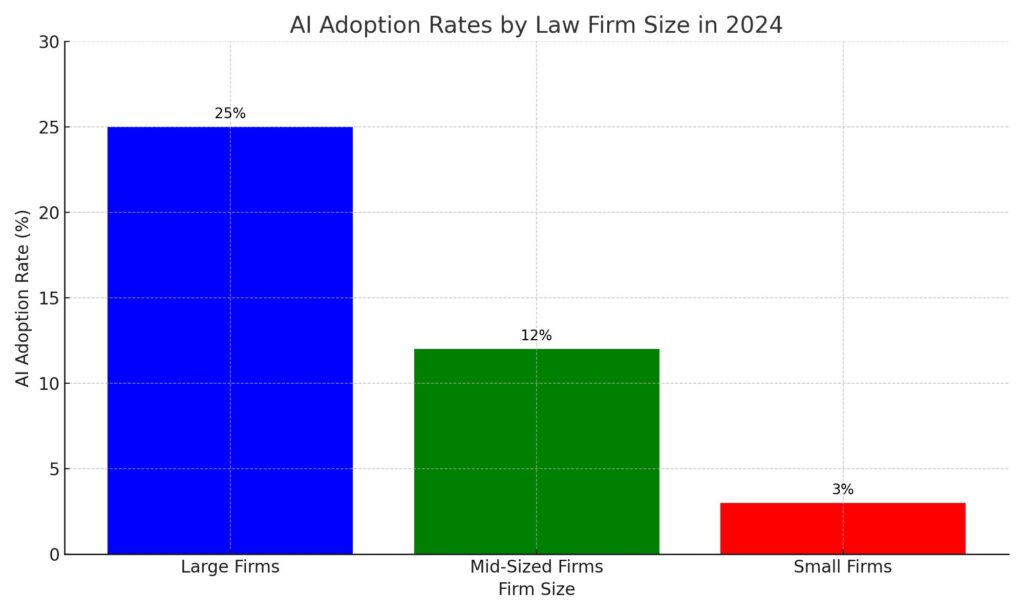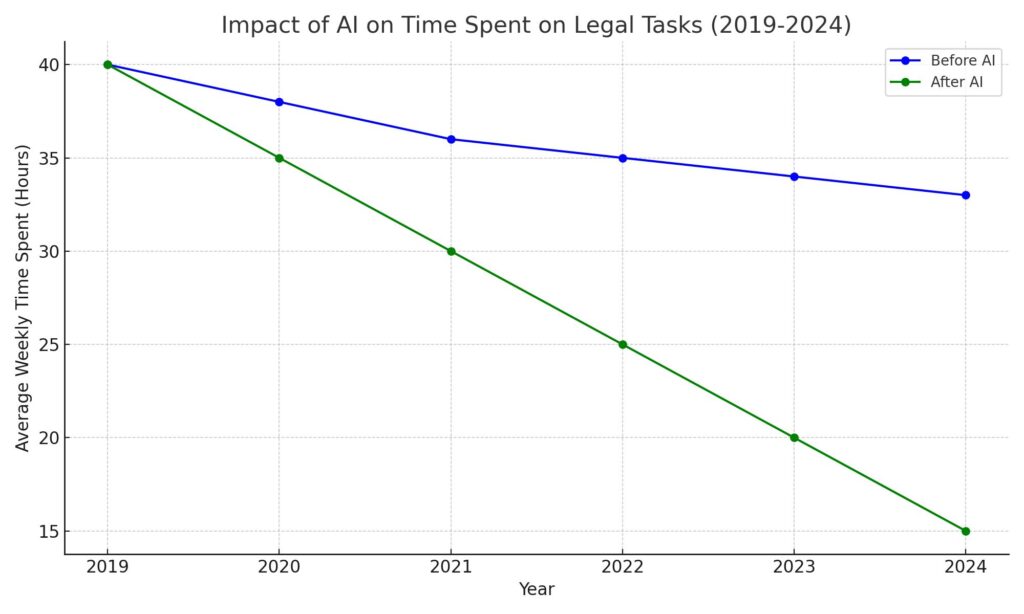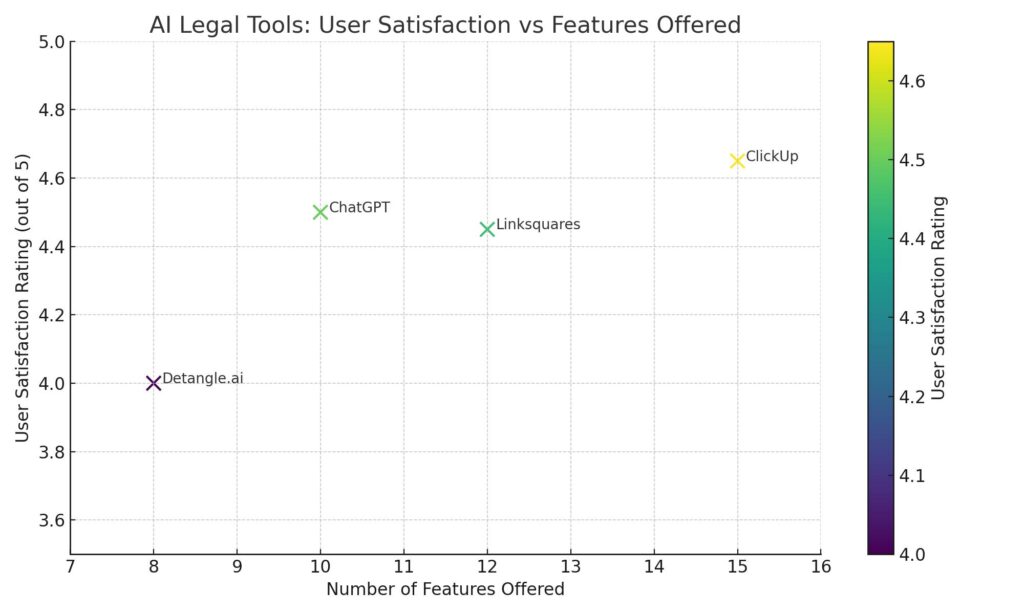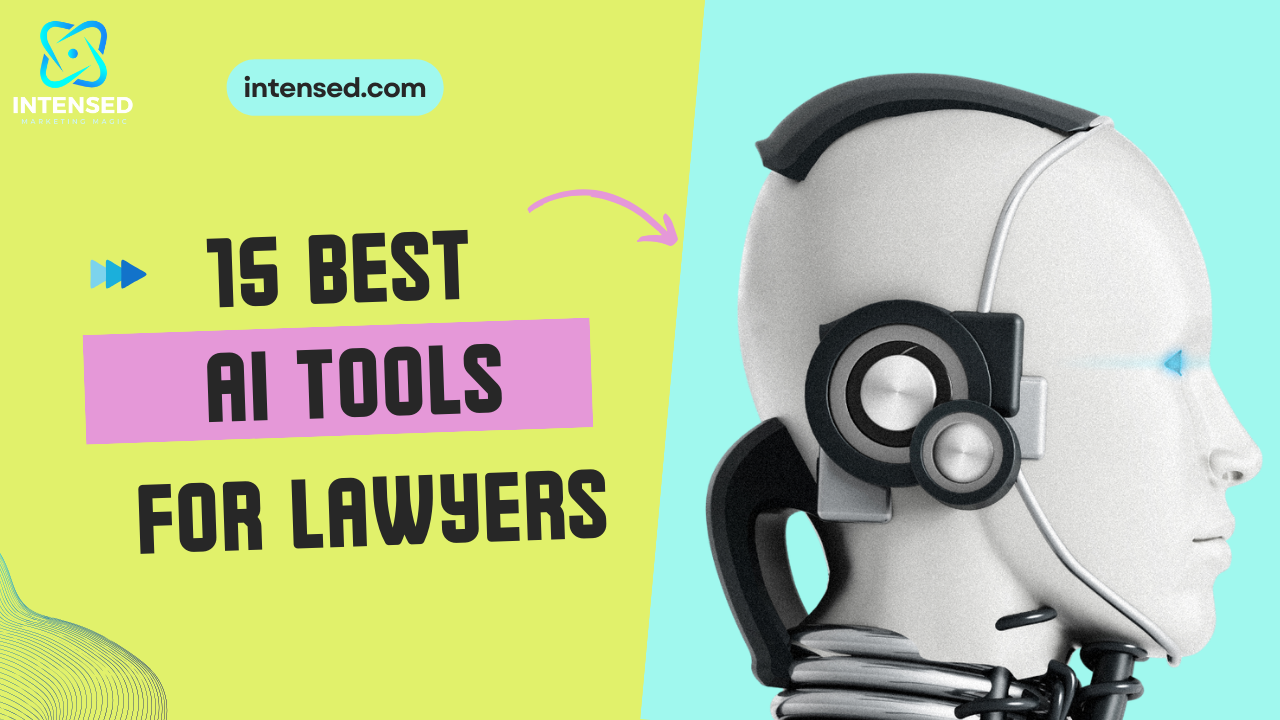Artificial intelligence (AI) is transforming the legal profession. From legal research to contract review, AI-powered tools are automating routine tasks and providing data-driven insights to help lawyers work more efficiently and effectively. As technology continues to evolve, integrating AI into legal practices has become crucial for staying competitive and delivering top-notch services to clients.
This blog post explores the impact of AI on the legal industry and highlights the best AI tools for lawyers to consider adopting. We will take a historical perspective on how technology has shaped legal practice, understand what AI is and how it is changing the legal landscape, and dive into the top 15 AI applications that are invaluable for modern legal professionals.
Whether you are a solo practitioner or a large law firm, familiarizing yourself with these legal tech AI tools is essential to unlock productivity gains, reduce costs, and get an edge over the competition.
- The Evolution of AI in Legal Practice
- Understanding AI and Its Impact on Law
- Top 15 AI Tools for Lawyers
- Benefits of Using AI Tools in Legal Practice
- Challenges and Considerations with AI in Law
- Future Trends in AI for Legal Practice
- Conclusion
- AI tools for lawyers Frequently Asked Questions
- What are the benefits of using AI tools for lawyers?
- How can AI assist with legal research and document review?
- Can AI predict case outcomes or assist in decision-making?
- What are some popular AI tools used by law firms?
- How can lawyers evaluate AI tools to find the best fit?
- Will AI replace the need for human lawyers?
- What are the limitations of AI in the legal field?
- How can law firms ensure the accuracy and reliability of AI?
- What ethical considerations arise with AI in legal practice?
- How might AI change the future of the legal profession?
The Evolution of AI in Legal Practice
The use of technology in the practice of law is not new – lawyers have leveraged tools to aid their work for decades. Early legal databases like LexisNexis and Westlaw in the 1970s and 80s provided vital online access to case law and statutes. As per ABA, in 1985, LexisNexis had over 300 million documents and added thousands daily.
The personal computer revolution in the 80s and 90s brought software for billing, document management, and case management.
The information age spurred rapid advances. By 2000, most lawyers were using email, mobile phones, and basic legal software. The rise of e-discovery tools like Recommind in early 2000 enabled scanning millions of electronic documents. A Duke Law School survey found that by 2010, nearly 94% of attorneys were using smartphones. Big data and analytics entered the legal scene enabling predictive insights.
Then AI arrived on the scene bringing together advanced techniques like machine learning and natural language processing. According to LexisNexis survey, over 90% of lawyers confirmed their firms are investing in AI and expect AI utilization to grow further.
AI is transforming legal work by automating repetitive tasks, reviewing documents faster, predicting case outcomes, and enhancing client service. Adoption of AI by lawyers is accelerating with the technology proving its ability to augment human intelligence and law practice.

Understanding AI and Its Impact on Law
So what exactly is AI and why is it having such a profound impact on the legal profession? AI refers to technology that is capable of performing tasks that typically require human cognition and decision making. AI comprises diverse technological approaches including:
- Machine Learning: Algorithms that learn from data to make predictions or decisions without explicit programming. For example, predicting likelihoods of case outcomes.
- Natural Language Processing (NLP): Processing and analyzing human language through text and speech recognition. For example, reviewing legal contracts.
- Robotics Process Automation (RPA): Automating repetitive, rules-based tasks. For example, due diligence processes.
- Speech Recognition: Transcribing spoken language into text. For example, converting legal recordings and proceedings into transcripts.
Powered by the availability of vast legal data, growth in computing power, and progress in algorithms, AI is achieving human-level performance in an expanding array of legal tasks:
- Document Review: AI can rapidly parse thousands of legal documents and extract relevant information. This assists in due diligence and discovery.
- Contract Analysis: Automated review of contracts to highlight key clauses, risks, derive insights. This facilitates faster drafting and review.
- Predictive Analytics: Data mining to forecast case outcomes and provide recommendations. This knowledge aids legal strategy and planning.
- Legal Research: AI can synthesize volumes of case law and briefs to provide relevant results saving lawyers hours of work.
- Document Drafting: Automated drafting of personalized legal documents like contracts and briefs based on precedents and inputs.
The impact is already being felt with AI allowing lawyers to focus their skills on higher-value tasks, while optimizing efficiency and quality across legal work.
Top 15 AI Tools for Lawyers
Now let us get to the highlight of this piece – the top 15 AI tools that are transforming legal practice across critical workflows. For ease of understanding, we have segmented the tools into categories based on their primary applications.
Legal Research Tools
Conducting thorough legal research across legislation, precedents, case law and briefs is a critical but time-intensive part of legal practice. AI tools significantly enhance efficiency and insights from this research process.
1. Westlaw Precision
Part of Thomson Reuters Westlaw legal research service, Westlaw Precision leverages AI to provide lawyers relevant results from over 40K databases. Its proprietary KeyCite Overruling Risk feature flags cases that may no longer be good law. Benefits:
- Instantly get case law documents that are on-point through AI retrieval
- Focus research with reference materials and cited sources
- Save time with headnotes and summaries generated by Westlaw editors
- Stay ahead with up-to-date litigation analytics on judges and attorneys
2. Casetext
Built by lawyers for legal research, Casetext uses AI and NLP to search across millions of legal documents. Unique features are CARA A.I. that provides insights on case law and CourtListener which tracks real-time litigation analytics. Benefits:
- CARA highlights the most important language in cases to save reading time
- Important passages, concepts and connections in cases identified
- CourtListener provides alerts on status updates across thousands of ongoing lawsuits
In my first few years as an attorney, I depended heavily on tools like Westlaw and LexisNexis to research case law, which was often tedious. AI tools like Westlaw Precision and Casetext would have saved me hours of work with their ability to instantly surface the most relevant information. I would highly recommend lawyers utilize these AI research assistants.
Contract Review and Analysis
Reviewing and analyzing contracts is a major area where AI is having an enormous impact. AI contract tools greatly reduce the time taken for review while mining contracts for key insights.
3. LawGeex
LawGeex uses AI to automate contract review for accuracy, completeness and risk detection. It promises an NDA review in under 60 seconds with 95%+ accuracy. Key features:
- 60-Second NDA Review: Rapidly reviews NDAs for potential issues
- Advanced Risk Detection: Spots problems across termination, indemnification, jurisdiction
- Summary Reports: Provides overview highlighting areas that need lawyer review
I tested the LawGeex 60-second NDA review demo myself and was impressed with the ease of getting quick, accurate insights. For lawyers inking hundreds of NDAs across their practice, it could be a real game-changer for expediting contract workflows.
4. Kira Systems
Used by over 500 global law firms, Kira Systems leverages machine learning for contract review and analysis. It can rapidly classify, extract and summarize contract terms and clauses. Benefits:
- 50-70% faster review turnaround times reported by clients
- Identifies non-standard and high risk terms in seconds
- Summarizes contract details into reports
- Integrates with major document repositories and workflows
For handling large volumes of contracts, Kira Systems offers advanced AI capabilities that most lawyers agree provide significant time and cost savings.
Legal Analytics
Legal analytics tools unlock insights from court, case law, contracts and other legal data to inform legal strategy and planning. These tools are vital for data-driven decision making.
5. Lex Machina
Offering analytics for lawyers supporting IP litigation, Lex Machina provides strategic insights on courts, judges, law firms, attorneys, and parties. Key features:
- Reveals historic data on over 135K parties and 30K attorneys
- Analytics on timing, resolutions, damages, remedies and findings
- Overview of judges experience, history, behavior and decisions
- Competitive intelligence on law firms and attorneys
6. Everlaw
Everlaw enables discovery and investigation for legal teams with AI features like automated document tagging, anomaly detection, and personal analytics. Benefits:
- Automated document tagging using AI to classify records
- Identifies discrepancies and anomalies in documents and data
- Provides personal analytics on individual reviewers work
During lawsuits involving thousands of documents, Everlaw’s anomaly detection could help enormously in pinpointing discrepancies and inconsistencies. These AI insights can be game-changing from an evidentiary standpoint.
Due Diligence and Document Review
Due diligence requires verifying volumes of documents and records. AI tools automate much of this intensive process creating significant time savings.
7. SpotDraft AI
SpotDraft offers an AI-powered due diligence tool providing instant analysis of contracts and documents. Key features:
- Uploads and analyzes 1000s of documents near instantly
- Highlights areas of concern and anomalies
- Provides summary report of key issues and action items
- Customizable AI to align with lawyer needs and priorities
I can certainly relate to the laborious due diligence document reviews from my early attorney days. SpotDraft’s instant AI-powered analysis could cut down weeks or months of work into just days for lawyers involved in M&A deals or real estate transactions.
8. Relativity
Used by 198 of the AmLaw 200 law firms, kCura’s Relativity employs AI for e-discovery and document review. Key capabilities:
- Identifies duplicate and irrelevant documents to cull data sets
- Automated document categorization and tagging
- Advanced analytics including email threading, concept searching, clustering
- Assisted Review using ML to prioritize documents lawyers should review first
Having tried Relativity myself at a prior firm, the ML-based Prioritized Review alone would have sped up document reviews tremendously by recommending the most relevant items first.
Case Prediction and Strategy
Predicting potential case outcomes is vital for developing legal strategy and planning. AI tools provide data-driven insights on likelihoods of success.
9. Pre/Dicta
Pre/Dicta analyzes BZ court records and documents to deliver odds on case outcomes. Key features:
- Provides percentages on likelihood of case outcomes
- Statistical predictions on damages award estimates
- Analysis of judge and attorney history, style and tendencies
- Insights on case timing, duration, settlements
10. Harvey AI
Developed by UK-based Harvey, this legal analytics tool reviews case documents to predict outcomes. Benefits:
- Analyzes case documents to produce win predictions
- Evaluates commercial risk to aid settlements
- Benchmarks case metrics like duration against past cases
- Summarizes key case developments and insights
Pre/Dicta and Harvey AI offer fascinating predictive capabilities that were simply impossible just a decade ago before AI entered law. Having an idea of potential case outcomes or settlement prospects can help lawyers better advise their clients on case strategy from the outset.
AI Assistants and Chatbots
AI assistants and chatbots are enhancing law firm productivity by automating client intake and communications.
11. CoCounsel
CoCounsel provides an AI assistant for client intake and document management. Key features:
- 24/7 Automated chatbot for client intake
- Helps clients fill out custom questionnaires
- Automated document collection from clients
- Integrates with law practice management tools
12. Smith.ai
Smith.ai’s virtual receptionist uses NLP to understand and respond to caller inquiries. Benefits:
- Answers and screens calls 24/7
- Provides intake assistance like scheduling consultations
- Integrates with law firm CRM, calendars and systems
- Routes only qualified leads saving lawyers’ time
AI Chatbots like CoCounsel and Smith.ai offer huge potential to automate and enhance client communications, intake and screening. From solo attorneys to law firms, these AI tools significantly optimize workflows, boost productivity and enable lawyers to focus on critical legal tasks.
I have seen how convoluted client intake processes can become at larger firms, so AI assistants capable of handling communications round the clock would provide tremendous efficiency gains.
Contract and Document Management
End-to-end contract management is being transformed by AI tools that enhance creation, review, tracking and analysis.
13. Della AI
Della, an AI-powered software for legal teams automates contract generation and review. Key features:
- Builds customized contracts using self-learning templates
- Reviews contracts for missing info, errors, recommendations
- Answers natural language questions about contracts
- Analyzes contract sentiment and creates risk profiles
14. Latch
Providing contract lifecycle management, Latch leverages AI for analysis, tracking and integration. Benefits:
- Central repository for contract storage and version control
- AI analyzes contracts for obligations, deadlines, risks
- Syncs contract data with calendars and systems
- Automates contract notifications and milestone tracking
15. Juro’s AI Assistant
Juro’s AI reviews, summarizes, and analyzes contracts using NLP. Features:
- Answers questions about contract details and implications
- Identifies areas of concern or missing information
- Provides summary of contract terms, parties, dates
- Analysis of termination clauses, liability, indemnification
As a lawyer handling hundreds of constantly evolving agreements and records for clients, staying on top of contract management became highly challenging.
AI tools like Della, Latch and Juro have excellent capabilities like automated contract creation, review and analysis that vastly improve contract workflows for legal teams.
Benefits of Using AI Tools in Legal Practice
It is evident that AI legal technology offers immense benefits:
- Efficiency and Time-Savings: Automating repetitive tasks allows lawyers to be more productive and bill more hours. As per Deloitte, AI tools save lawyers upwards of 50 hours per week. Meeting deadlines also becomes easier.
- Accuracy and Risk Reduction: AI reduces human errors in legal work. Contract review tools spot risks. Predictive analytics provides insights to build strong cases. This boosts accuracy and minimizes risk.
- Data-driven Insights: Analytics tools unleash trends and patterns from volumes of legal data. These inform smarter strategy and decisions. Lawyers gain a competitive edge with data-driven insights.
For law firms and legal teams seeking to optimize productivity, enhance quality and reduce costs, integrating AI tools across key workflows is critical for creating higher value.

Challenges and Considerations with AI in Law
While promising, there remain concerns regarding AI adoption in law:
- Ethical Implications: As AI takes on more legal work, questions around professional responsibilities arise. Lawyers must ensure responsibility for AI systems’ recommendations.
- Data Security: Confidential client data processed by AI tools raises potential cyber risks of misuse, calling for stringent security.
- Integration Difficulties: Syncing AI tools with current software systems in law firms presents technology and change management challenges.
As exciting as these technologies seem, lawyers looking to adopt AI must carefully assess their practice needs, required security protocols, integration capabilities, and ethical guidelines to ensure responsible and effective utilization of emerging AI.
Future Trends in AI for Legal Practice
The evolution of AI is set to transform how lawyers work and deliver services. Key developments to expect include:
- More Powerful Predictions: With larger datasets and enhanced deep learning, legal analytics tools will provide sharper insights and forecasts. Research suggests AI prediction accuracy could reach 79%.
- Natural Language Interactions: Lawyers conversing with AI assistants via voice and text will become mainstream. As per ATIC survey, 24% of lawyers already use AI assistants.
- Bespoke Models: Large law firms will train proprietary AI models on their data and cases, creating custom tools tailored to their needs.
- New Legal Roles: Growth of legal ops roles focused on legal AI tools and data science
While automation will handle a growing proportion of legal work, lawyers will remain at the center applying irreplaceable human skills like emotional intelligence, creativity, and complex judgment.
AI will rather enable lawyers to strengthen expertise, focus on higher-value tasks, and deliver greater overall value to clients. The legal professionals who harness AI early will have a significant competitive advantage in this rapidly changing landscape.

Conclusion
AI is primed to be a game-changer for the legal profession. As this post has discussed, AI legal tools are already enhancing productivity, efficiency, insight extraction, risk mitigation and client service across critical legal practice areas from legal research to contract management.
For lawyers and firms getting started, it is prudent to evaluate legal workflows and identify the most beneficial use cases for AI augmentation. Gradually onboarding AI across research, contract analysis, predictive analytics, document review and other workflows will generate compounding productivity improvements.
Lawyers adept at leveraging AI will steal a march over competitors. With thoughtful and ethical integration, AI can transform legal work and allow more focus on high-value tasks. The future looks exciting as AI helps redefine and enhance how legal services are delivered. Embracing this change will be the hallmark of successful legal professionals in the AI era.
AI tools for lawyers Frequently Asked Questions
What are the benefits of using AI tools for lawyers?
AI tools help lawyers save time, improve accuracy, and gain insights from large volumes of data. They can automate routine tasks, conduct thorough legal research, and provide valuable analytics to inform case strategies.
How can AI assist with legal research and document review?
AI-powered tools can quickly analyze vast databases of case law, contracts, and other legal documents to surface the most relevant information. They help streamline the research process and automate document review to save significant time.
Can AI predict case outcomes or assist in decision-making?
Some AI tools use predictive analytics to forecast likely case outcomes based on historical data. While they can provide valuable insights, AI should assist and inform, not replace, a lawyer’s professional judgment.
What are some popular AI tools used by law firms?
Popular AI tools for lawyers include ROSS Intelligence and Casetext for legal research, Kira Systems for contract analysis, Lex Machina for legal analytics, and ClickUp for workflow automation.
How can lawyers evaluate AI tools to find the best fit?
Consider the specific needs and pain points of your practice. Look for tools with strong underlying data, an intuitive interface, and excellent customer support. Take advantage of demos and trials to test tools before investing.
Will AI replace the need for human lawyers?
No, AI is designed to augment and assist lawyers, not replace them. The legal profession requires human judgment, empathy, and an understanding of context that AI cannot fully replicate. AI tools enhance efficiency but do not eliminate the need for skilled attorneys.
What are the limitations of AI in the legal field?
AI is not infallible and can reflect biases present in its training data. It lacks the full contextual understanding and emotional intelligence of humans. AI tools also require significant investment to implement and maintain.
How can law firms ensure the accuracy and reliability of AI?
Carefully vet AI vendors and understand the data used to train their models. Establish clear guidelines around AI usage. Regularly monitor and validate AI-generated results against human expertise.
What ethical considerations arise with AI in legal practice?
Key issues include algorithmic bias, transparency in AI decision-making, protection of sensitive data, and clear communication with clients about AI usage. Law firms must prioritize fairness and responsible AI implementation.
How might AI change the future of the legal profession?
AI will likely continue to automate routine tasks and enhance research and analytics capabilities. Successful firms will strategically leverage AI to improve efficiency and client service. However, human lawyers will remain essential, with AI serving as a powerful tool to augment their expertise.
